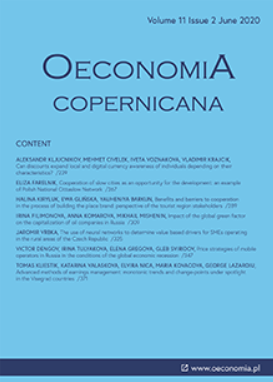Transformation of energy balances with dominant coal consumption in European economies and Turkey in the years 1990–2017
Transformation of energy balances with dominant coal consumption in European economies and Turkey in the years 1990–2017
Author(s): Izabela Jonek-KowalskaSubject(s): Business Economy / Management, Energy and Environmental Studies, Economic history, Economic policy, Environmental and Energy policy, Economic development, Transformation Period (1990 - 2010), Present Times (2010 - today)
Published by: Instytut Badań Gospodarczych
Keywords: energy balance; European economies; links between energy policy and economy;
Summary/Abstract: Research background: Energy policy is closely linked to economic development. Therefore, its optimization is an important issue especially in the contemporary European environmental conditions. EU regulations enforce a reduction of carbon dioxide emissions and the abandonment of non-renewable energy resources. Instead, they promote renewable energy sources. In this way, new legal and environmental circumstances are becoming the main reason for the transformation of energy balances, which is a real economic and technological challenge. This transformation requires a strategic and effective approach, especially in those countries which until now have used mainly hard coal in the energy sector. Purpose of the article: According to above justification, the main purpose of the article is to identify the strategies for the transformation of energy balances that were implemented in the years 1990–2017 by chosen European countries and Turkey. Methods: The study period covers the years 1990–2017, and the subject of the research at first applies to all European countries, and then to 7 countries selected due to their high share of bituminous coal in energy balance in the first year of the analysis, treated as the initial point of transformation (1990). As a result of this selection, 6 EU members and Turkey with the largest share of coal in energy production in the year 1990 are examined. Particularly, an analysis of the trends in their energy balances in the years 1990–2017 is conducted. The research uses data on nonrenewable energy consumption and renewable energy resources and the total energy consumption. The research methodology includes: analysis of the structure and dynamics, evaluation of trends and comparative analysis and presentation of development strategies. At the end of the article, a comparative analysis is carried out, the economic consequences of identified changes are assessed, and recommendations are formulated aimed at optimizing the structure of the energy balance in the future. Findings & Value added: Generally, there are four theoretical and empirical patterns of transformation strategies of energy balances with dominant coal consumption: 1) using other nonrenewable energy resources; 2) replacing non-renewable energy resources with renewable ones; 3) using nuclear energy instead of coal; 4) increasing coal consumption as available and efficient energy resource. It was found that the examined countries implement mainly the strategy in which the decreasing share of coal is made up for by an increasing share of gas.
Journal: Oeconomia Copernicana
- Issue Year: 10/2019
- Issue No: 4
- Page Range: 627-647
- Page Count: 21
- Language: English

